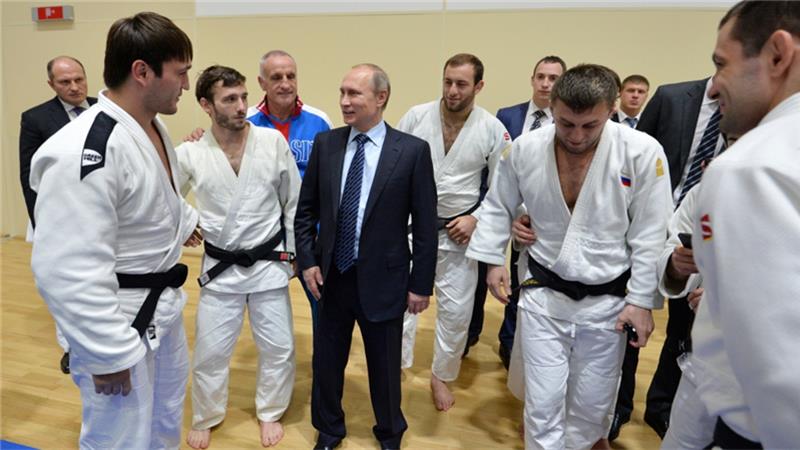The doping scandal is the latest in a string of misadventures in Putin’s pursuit of Soviet-style greatness.
On November 10, the story of Russia’s state-organised athletic doping programme exploded on to front pages worldwide. Apparently, the scale is so egregious that it could cost the country its trip to the Rio de Janeiro Olympics in 2016.
According to the findings of an independent report commissioned by the World Anti-Doping Agency (WADA), this extensive scheme was encouraged by Russian state officials, and included wholesale cover-up of positive doping test results, “intentional and malicious destruction” of about 1,500 test samples by the lab in charge, and intimidation of laboratory workers by security agents.
British tabloid the Daily Mirror carried on its first page a collage of illuminated Olympic rings with a sinister-looking Vladimir Putin, his index finger pointing upwards, headlined “The Fraud of the Rings” in stark lettering.
By way of contrast, when viewing a website of any pro-government Russian newspaper, such as Pravda or Izvestiya, one would have to scroll down past rows of news items of dubious import to learn anything of the scandal.
On perusing the article, the reader would be presented with interviews with retired Russian athletes blaming the scandal on the US and the West, who “acted only out of envy of Russia’s athletic prowess, hellbent on its humiliation”.
String of misadventures
“Russian athletes’ feats have long been the envy of Western sports bureaucrats,” said one. “This has to do with politics: Russia is being attacked on all sides,” said the other, before adding: “What will they do next: Accuse Putin himself of handing out the doping pills?”
We – the sinister “they” in this metaphorical question – would not be wrong in answering with a metaphorical, “Yes, indeed.”
In his pursuit of Soviet-style greatness, Vladimir Putin has entangled his people in a string of misadventures of which the doping scandal is but the latest. He has sought to gain short-term and illusory prestige at the expense of Russia’s long-term reputation and citizens’ faith in its institutions.
In the process, he has been feeding Russians the pill of propaganda as inoculation against any truth other than the state-sanctioned, Soviet-style “us versus them” dichotomy. As a result, today’s Russia is a Potemkin village of impressive facades behind which the foundations are in dire disrepair.
During Putin’s first decade in power (including Dmitry Medvedev’s nominal stint as president from 2008 to 2012), the social contract was fuelled by the high and rising price of oil and entailed curtailment of political freedoms in exchange for stability and prosperity.
Standards of living rose steadily for all income levels: The poor got a bank loan for a new Hyundai, those in the burgeoning middle class spent their vacations on the beach in Goa, while the rich bought their second homes on the Mediterranean coast.
That contract was no longer viable following Russia’s annexation of Ukraine’s Crimea in March 2014, the ensuing Western sanctions, and the precipitous drop in the price of oil, causing a severe contraction of the economy.
The dangerously tilting Potemkin facades needed propping up, quick. Russians would have to learn to tighten their belts, ignore their emptying refrigerators and cancelled beach getaways and root for Team Russia on battlefields both military and athletic, real and imaginary. An Orwellian propaganda machine would help them to keep sight of the “enemy” while instilling a sense of “victimhood” contrary to all common sense.
‘Historical justice’
Thus, the majority of Russians were able to revel in the spectacle of the Sochi Winter Olympics last year, while ignoring opposition reports detailing its kickback construction schemes that benefited Putin’s coterie to the tune of $30bn.
Crimea’s annexation was presented as restoration of “historical justice” rather than the first post-World War II European land grab and the tremendous economic burden that it became owing to sanctions and the economic blockade of the peninsula.
Russia’s armed support of the bloody separatist conflict in Ukraine’s Donbass region that led to 8,000 deaths and widespread destruction was portrayed as “humanitarian support” provided to fellow ethnic Russians fighting for their rights. The new military spectacle – in Syria – was presented as assistance to Russia’s long-time ally in his fight against ISIL and other forces of chaos.
Likewise, Kremlin’s “ministry of truth” hacks have gone into overdrive trying to obscure the stark possibility that 220 Russian holidaymakers may have paid with their lives for Putin’s Syrian adventure when their plane fell out of Egypt’s sky.
The doping test fraud scandal is not in the same league as Moscow’s instigation of the separatist warfare in the Donbass. Nevertheless, it serves as a potent symbol, an encapsulation of everything that is wrong with Putin’s glory project.
One cannot lie to all people at all times, as the adage goes, and Russians will sooner or later wake up to the reality of Putin’s Orwellian politics and see it for what it is: an attempt by an ageing dictator to cling to power at the expense of his country’s viability as an accountable, modern state.
Peter Zalmayev is director of the Eurasia Democracy Initiative, an international non-profit organisation dedicated to the promotion of democracy and rule of law in post-Communist transitional societies of Eastern and Central Europe, the Caucasus and Central Asia.
The views expressed in this article are the author’s own and do not necessarily reflect Al Jazeera’s editorial policy.
Origin – aljazeera.com


You must be logged in to post a comment.